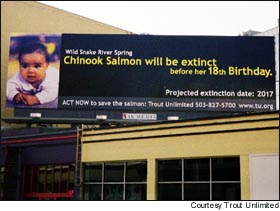forum
library
tutorial
contact

Scientific Review Group Says Salmon
Could Be Gone by the 21st Century
by Lynn Francisco and Bill Bakke
NW Fishletter, May 3, 1996
|
the film forum library tutorial contact |

|
Scientific Review Group Says Salmon
by Lynn Francisco and Bill Bakke
|
 In a report that could rock the foundations of salmon recovery, the Independent Scientific Review Group has warned the Northwest Power Planning Council that without dramatic changes in Columbia River operations, salmon will be extinct by the next century. The group's "new vision" of the Columbia system includes such potentially controversial recommendations as drawdowns and new flow regimes, all to restore and enhance habitat and promote genetic diversity. The key to saving salmon, said the report, lies in habitat restoration, a strategy that demands returning the river to a more normative state. That doesn't mean turning the river into a pristine, pre-dam waterway, said ISG member and Montana fisheries professor Jack Stanford, but it does mean vast changes in the way the river is run.
In a report that could rock the foundations of salmon recovery, the Independent Scientific Review Group has warned the Northwest Power Planning Council that without dramatic changes in Columbia River operations, salmon will be extinct by the next century. The group's "new vision" of the Columbia system includes such potentially controversial recommendations as drawdowns and new flow regimes, all to restore and enhance habitat and promote genetic diversity. The key to saving salmon, said the report, lies in habitat restoration, a strategy that demands returning the river to a more normative state. That doesn't mean turning the river into a pristine, pre-dam waterway, said ISG member and Montana fisheries professor Jack Stanford, but it does mean vast changes in the way the river is run.
"The history of salmon restoration is rooted in technology, such as by-pass facilities and hatcheries. [We recommend] keeping the salmon in their habitat and letting the river do the work," said Stanford.
While the group was short on specifics, drawdowns were touted as one way to restore a more river-like habitat. Drawdowns expose shoreline, allowing the river to redistribute gravel and nutrients, and eventually restore habitat that salmon need for feeding, resting and spawning. Equally important, the group said, are changes in reservoir releases, replacing the frequent peaks and valleys caused by power operations with flooding that resembles the spring freshet. Dramatic change in water levels raises havoc with shallow water habitat, where juvenile salmon food is produced. The more natural flooding, known as scouring, moves gravel around and reworks river channels, restoring habitat complexity.
The more natural river system helps promote genetic diversity, another key to salmon survival, according to the panel. Habitat destruction has isolated many stocks, leaving them more vulnerable to environmental or other problems. "We need population diversity to cope with habitat change such as a poor ocean environment," said Stanford. The strategy also makes techniques such as transportation and hatcheries "irrelevant." Both came in for sharp criticism because both reduce genetic diversity by selecting for the average.
Council chairman John Etchart called the proposal "a new paradigm, a new way of thinking about salmon survival...[which] calls into question many of the present management practices for the Snake and Columbia rivers." The panel reviewed more than 4,000 articles and studies to prepare its report. It has promised to have the document peer reviewed when it is final.
Related Pages:
2017 is Just Around the Corner by Paul VanDevelder, High Country News, 3/23/9
Will We Save Our Salmon? by Ted Kerasote, Sports Afield Magazine, 3/1
learn more on topics covered in the film
see the video
read the script
learn the songs
discussion forum
